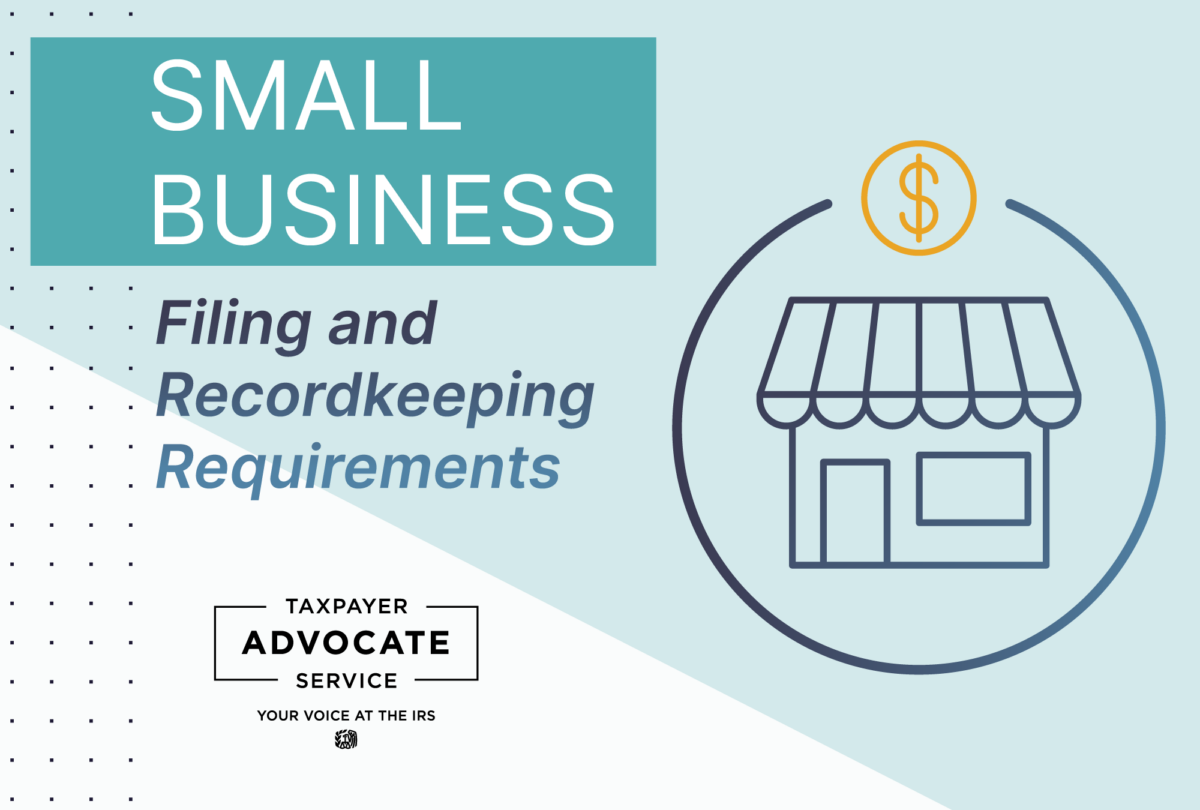Irs requirements for business receipts
Popular search terms:
Exit search
Home > Tax Tips > Small Business Filing and Recordkeeping Requirements
Published: April 24, 2024 | Last Updated: May 1, 2024
Small Business Filing and Recordkeeping Requirements

There are about 57 million small businesses and self-employed taxpayers in the United States, including:
- Corporations and partnerships with assets less than $10 million;
- Sole proprietors;
- Independent contractors;
- Members of a partnership that carries on a trade or business;
- Others in business for themselves, even if the business is part-time; and
- Gig workers (i.e., Uber/Lyft drivers, owners of Airbnb rentals, delivery services, etc.).
The Taxpayer Advocate Service is sharing the following information with small business taxpayers to:
- Help you meet your filing requirements;
- Share resources for information and tax return preparation;
- Help you file accurate returns.
Small Business Filing Requirements
Generally, the federal tax forms you will need to file vary depending on the type of business:
| Business Entity | Type of Tax | Tax Forms |
| Sole Proprietor | Income Tax | Form 1040/1040SR Schedule C or F |
| Self-Employment Tax | Form 1040/1040SR Schedule SE |
| Estimated Tax | Form 1040-ES |
| Employment Taxes | Forms 940 and 941, 944 or 943 |
| Partnership | Annual return of Income | Form 1065 |
| Employment Taxes | Forms 940 and 941, 944 or 943 |
| Partner in Partnership (Individual) | Income Tax | Form 1040/1040SR Schedule E |
| Employment Taxes | Form 1040/1040SR Schedule SE |
| Estimated Tax | Form 1040-ES |
| Corporation (C or S) | Income Tax – C Corporation | Form 1120 |
| Income Tax – S Corporation | Form 1120-S |
| Estimated Tax | Form 1120-W (C-Corp Only) |
| Employment Taxes | Forms 940 and 941, 944 or 943 |
| S Corporation Shareholder | Income Tax | Form 1040/1040SR Schedule E |
| Estimated Tax | Form 1040-ES |
Recordkeeping
As a small business, you may have many different types of returns that are due, and many different types of deductions. As a busy small business owner, it’s important to put a user-friendly recordkeeping system in place.
You may need to substantiate income and deductions. Good records can assist you in preparing financial records, keeping track of property and deductions and so much more. Good records can also assist you in knowing exactly where to target funding and reducing expenditures to optimize profit. Your recordkeeping should keep track of:
- Gross Receipts;
- Inventory, including any merchandise withdrawn from sale for personal use; and
- Expenses.
For more helpful information for small businesses, see Tax Tip: Small business tax highlights, which addresses key components of small business ownership including:
- The general types of business taxes;
- The importance of making estimated tax payments if required;
- Payment options; and
- Ten Federal Tax Tips to help small business owners:
- Know your limitations and know when you need to ask a professional for help
- Keep adequate records
- Separate your personal and business finances
- Correctly classify your business
- Manage payroll
- Subscribe to e-News for Small Businesses
- Research small business tax deductions
- Self-employment tax deduction
- Make your tax payments timely
- For faster processing, file your returns electronically
TAS resources
- Small Business
- Get Help: Self-Employment Taxes
- Get Help: Consequences of Not Filing
- Low Income Taxpayer Clinics
- Taxpayer Roadmap
- Publication 5341,The Taxpayer Roadmap
- Publication 5341 (SP), The Taxpayer Roadmap (Spanish)
IRS resources
- Small Business and Self-Employed Tax Center
- Self-Employed Individuals Tax Center
- Small Business Forms and Publications
- Publication 334, Tax Guide for Small Business
- Publication 583, Starting a Business and Keeping Records
- Publication 4591, Small Business Federal Tax Responsibilities
- Publication 535, Business Expenses
- Publication 463, Travel, Gift and Car Expenses
- Employment Taxes and the Trust Fund Recovery Penalty (TFRP)
- Publication 505, Tax Withholding and Estimated Tax
- Publication 542, Corporations
- Publication 225, Farmer’s Tax Guide
- Gig economy:
- Gig Economy Tax Center
- Publication 5369, Gig Economy and Your Taxes: Things to Know
- Your Taxes in the Sharing Economy
- IRS gov: Need someone to prepare your tax return?
- IRS gov: Directory of Federal Tax Return Preparers with Credentials and Select Qualifications
Visit the Taxpayer Advocate Service’s Get Help center for a list of tax topics to assist you with resolving many tax related issues.
For more updates from the Taxpayer Advocate Service, visit the news and information center to read the latest tax tips, blogs, alerts and more.


